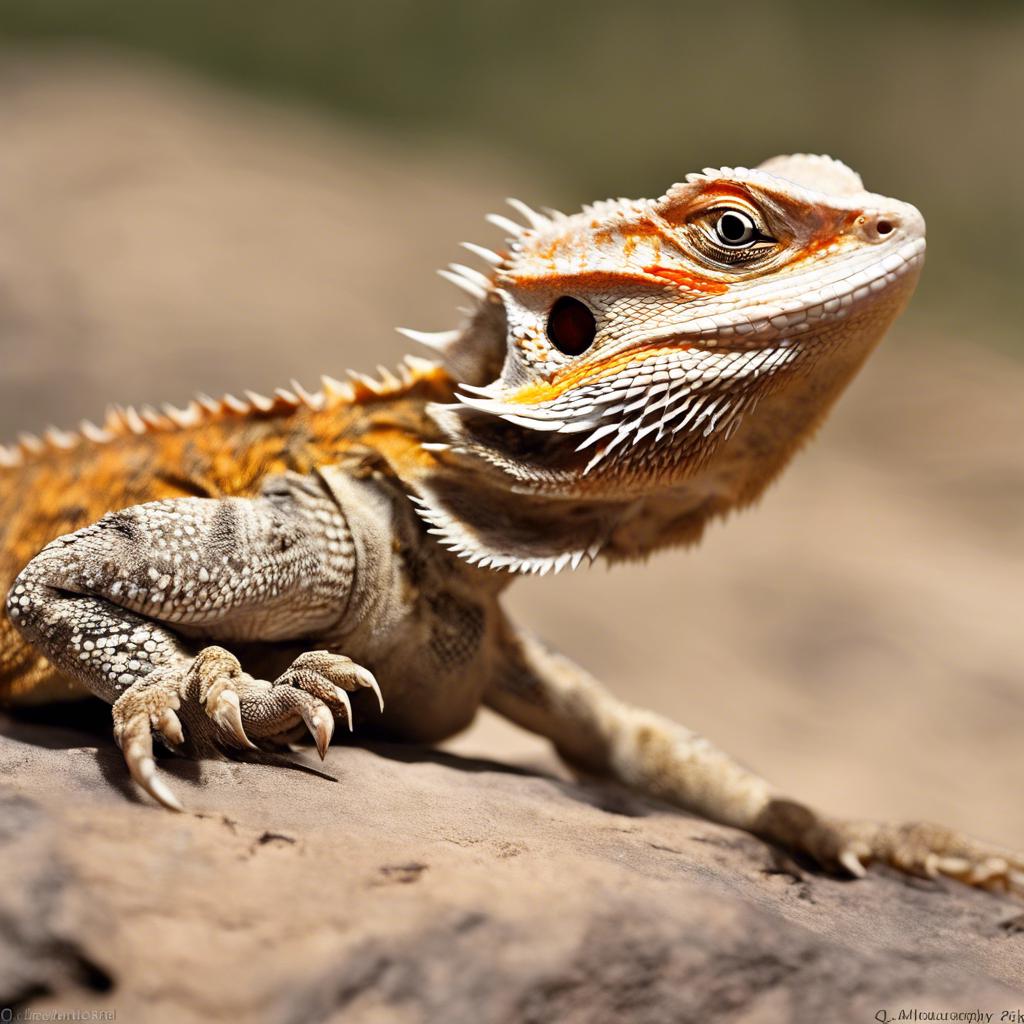Bearded dragons, scientifically known as Pogona, are a type of lizard native to Australia. They are named for the spiky beard-like scales on their throats that they puff out when they feel threatened or excited. Bearded dragons have become increasingly popular as pets due to their docile nature and unique appearance.
One of the reasons why bearded dragons make great pets is their calm and friendly demeanor. Unlike some other reptiles, they are not aggressive and can be easily handled. They are also relatively low-maintenance pets, making them suitable for both experienced reptile owners and beginners. Bearded dragons are known for their curious and sociable nature, often enjoying interaction with their owners.
Key Takeaways
- Bearded dragons are a popular pet reptile known for their unique appearance and docile nature.
- Naming your bearded dragon is important for building a strong bond and recognizing their individuality.
- Bearded dragons can recognize their names and respond to them with proper training.
- Creating a comfortable environment and feeding your bearded dragon a balanced diet are crucial for their health and well-being.
- Understanding common health issues and seeking proper veterinary care can help ensure a long and happy life for your bearded dragon.
Understanding the Psychology of Bearded Dragons
Bearded dragons have their own unique way of communicating with both humans and other animals. They use a combination of body language and vocalizations to express themselves. For example, when a bearded dragon feels threatened or stressed, it may puff out its beard, flatten its body, and open its mouth wide to display aggression. On the other hand, when a bearded dragon is content and relaxed, it may bask in the sun or curl up in a comfortable position.
In terms of interaction with their environment, bearded dragons are known for their love of climbing and exploring. They enjoy having a variety of objects in their enclosure to climb on, such as branches or rocks. Providing them with a stimulating environment can help keep them mentally and physically active.
The Importance of Naming Your Bearded Dragon
Naming your bearded dragon is an important part of the bonding process between you and your pet. Giving your bearded dragon a name helps create a sense of identity and personal connection. It also makes it easier to communicate with your pet and establish a training routine.
When you give your bearded dragon a name, it becomes more than just a reptile in a tank. It becomes a member of your family with its own unique personality. This can help strengthen the bond between you and your pet, making it easier to care for and understand its needs.
Do Bearded Dragons Recognize Their Names?
Research on whether or not bearded dragons can recognize their names is limited, but many bearded dragon owners have reported that their pets do respond to their names. While it is unclear whether they understand the meaning of their names or simply associate them with positive experiences, it is clear that they can learn to recognize and respond to specific sounds.
Personal experiences from bearded dragon owners suggest that these reptiles can indeed recognize their names. Many owners have reported that their bearded dragons will turn their heads or perk up when called by name. Some even claim that their bearded dragons will come when called, similar to a dog.
How to Train Your Bearded Dragon to Respond to Its Name
Training your bearded dragon to respond to its name can be a fun and rewarding experience. Here is a step-by-step guide on how to train your bearded dragon:
1. Choose a short and simple name for your bearded dragon. Avoid names that sound similar to other words or commands.
2. Begin by saying your bearded dragon's name in a calm and gentle tone whenever you interact with it. Repeat the name several times during each interaction.
3. Reward your bearded dragon with a treat or praise whenever it responds to its name by turning its head or perking up.
4. Gradually increase the distance between you and your bearded dragon when calling its name. This will help reinforce the association between its name and your voice.
5. Practice calling your bearded dragon by name in different locations and situations to ensure that it recognizes its name in various contexts.
6. Be patient and consistent with the training process. It may take some time for your bearded dragon to fully understand and respond to its name.
Tips for Naming Your Bearded Dragon

When it comes to naming your bearded dragon, the possibilities are endless. Here are some creative ideas for naming your bearded dragon:
1. Choose a name that reflects its appearance, such as Spike or Scaley.
2. Consider naming your bearded dragon after a famous dragon from literature or mythology, such as Draco or Smaug.
3. Look for inspiration in other languages or cultures. For example, the word “Pogona” is derived from the Greek word for “bearded.”
4. Consider naming your bearded dragon after a favorite character from a book, movie, or TV show.
When choosing a name for your bearded dragon, it is important to consider factors such as gender, personality, and personal preference. Ultimately, the most important thing is to choose a name that you and your bearded dragon both love.
Bearded Dragon Care: Creating a Comfortable Environment
Creating a comfortable and safe environment is essential for the well-being of your bearded dragon. Here are some tips on how to set up an ideal habitat:
1. Enclosure: Bearded dragons require a spacious enclosure to move around and explore. A glass terrarium or reptile tank with secure ventilation is recommended.
2. Substrate: Choose a substrate that is safe and easy to clean, such as reptile carpet or paper towels. Avoid loose substrates like sand or wood chips, as they can cause impaction if ingested.
3. Temperature and Lighting: Bearded dragons are ectothermic animals, meaning they rely on external heat sources to regulate their body temperature. Provide a temperature gradient in the enclosure with a basking spot of around 95-105°F (35-40°C) and a cooler side of around 75-85°F (24-29°C). Use a UVB light to provide the necessary UV radiation for vitamin D synthesis.
4. Hideouts and Decorations: Bearded dragons enjoy having hiding spots and objects to climb on. Provide rocks, branches, and artificial plants for them to explore and bask on.
Bearded Dragon Diet: Feeding Your Pet with the Right Foods
A balanced diet is crucial for the health and well-being of your bearded dragon. Here are some guidelines on what to feed your pet:
1. Insects: Bearded dragons are insectivores and require a diet rich in insects. Feed them a variety of appropriately sized insects, such as crickets, mealworms, and dubia roaches. Dust the insects with a calcium supplement before feeding.
2. Vegetables: Bearded dragons also require a variety of vegetables in their diet. Offer a mix of leafy greens, such as collard greens, kale, and dandelion greens. Avoid feeding them spinach or lettuce, as they have low nutritional value.
3. Fruits: Fruits should be offered as occasional treats due to their high sugar content. Offer small amounts of fruits like berries or melons as a special treat.
4. Water: Provide fresh, clean water in a shallow dish at all times. Some bearded dragons may prefer to drink water from droplets on leaves or from misting.
It is important to feed your bearded dragon an appropriate amount of food based on its age and size. Younger dragons require more frequent feedings, while adults can be fed every other day.
Common Health Issues in Bearded Dragons
Like any pet, bearded dragons are susceptible to certain health issues. Here are some common health problems that bearded dragons may face:
1. Metabolic Bone Disease (MBD): MBD is caused by a lack of calcium and vitamin D in the diet. It can lead to weak bones, deformities, and even death. Ensure that your bearded dragon's diet includes calcium-rich foods and proper UVB lighting.
2. Respiratory Infections: Bearded dragons can develop respiratory infections if they are kept in a damp or dirty environment. Symptoms include wheezing, coughing, and nasal discharge. Keep the enclosure clean and provide proper ventilation to prevent respiratory issues.
3. Parasites: Bearded dragons can be affected by internal and external parasites, such as mites or worms. Regularly check your bearded dragon for any signs of parasites and consult a veterinarian if necessary.
4. Impaction: Bearded dragons may accidentally ingest substrate or other foreign objects, leading to impaction. This can cause blockages in the digestive system and require veterinary intervention. Avoid loose substrates and provide a clean environment to prevent impaction.
Regular veterinary check-ups and proper husbandry practices can help prevent and treat these common health issues in bearded dragons.
Building a Strong Bond with Your Bearded Dragon through Name Recognition
In conclusion, naming your bearded dragon is an important part of the bonding process between you and your pet. While research on whether or not bearded dragons can recognize their names is limited, many owners have reported that their pets do respond to their names. Training your bearded dragon to respond to its name can be a fun and rewarding experience, helping to strengthen the bond between you and your pet.
Creating a comfortable environment, providing a balanced diet, and addressing common health issues are all essential for the well-being of your bearded dragon. By taking proper care of your pet and establishing name recognition, you can build a strong bond with your bearded dragon that will last a lifetime.
If you're curious about whether bearded dragons know their name, you might also be interested in learning about the potential effects of stress on these fascinating reptiles. Stress can have serious consequences for bearded dragons, and it's important for owners to understand how to minimize stress in their pets. To delve deeper into this topic, check out this informative article on Can Bearded Dragons Die from Stress? It provides valuable insights into the impact of stress on these creatures and offers helpful tips on how to create a calm and comfortable environment for your bearded dragon.
FAQs
What is a bearded dragon?
A bearded dragon is a type of lizard that is native to Australia. They are popular pets due to their docile nature and ease of care.
Do bearded dragons have the ability to recognize their name?
There is no scientific evidence to suggest that bearded dragons have the ability to recognize their name. However, they may become accustomed to hearing a certain sound or tone of voice associated with their name and respond accordingly.
Can bearded dragons learn commands?
Bearded dragons can learn simple commands such as “come” or “stay” through positive reinforcement training. However, their ability to learn more complex commands is limited.
How do bearded dragons communicate?
Bearded dragons communicate through a variety of methods including body language, head bobbing, arm waving, and vocalizations such as hissing or chirping.
Do bearded dragons have personalities?
Yes, bearded dragons have distinct personalities and can exhibit a range of behaviors and preferences. Some may be more outgoing and social while others may be more reserved.
Can bearded dragons bond with their owners?
Bearded dragons can form bonds with their owners through regular interaction and positive reinforcement training. However, their level of attachment may vary from individual to individual.

